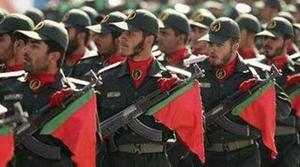Iran's bombEighteen Guard members killed in Iran base blast
The Iranian Revolutionary Guard was created in 1979 as an ideological bulwark to defend the clerical rule; in time, the Guard has become a vast military-based conglomerate, amassing a network of economic and political power that extends to virtually every aspect of life in Iran; as the West’s covert action against Iran’s nuclear weapons program intensifies, we note more and more “accidents” in Revolutionary Guards bases; in the most recent such accident, 18 Guardsmen were killed and fourteen wounded

Revolutionary Guard members on parade // Source: thecuttingedgenews.com
An explosion set off by a fire that had spread to an ammunition depot at a military base in western Iran killed eighteen members of the country’s powerful Revolutionary Guard, the state news agency reported Wednesday.
The IRNA news agency said fourteen other Guard troops were wounded in the blast Tuesday in the city of Khoramabad, some 500 kilometers southwest of the capital, Tehran. The injured were taken to hospitals in Khoramabad. The report said the blast was caused by a fire that had reached the ammunition storage area, but there was no word on what had ignited the blaze. In their first reports of the blast late Tuesday, most Iranian media said the explosion was an accident.
Daily News @ Economic Review reports that although Khoramabad has not seen violence recently, it is geographically close to Kurdish-populated areas that have been the scene in recent months of several attacks by Kurds disgruntled with the central government.
Iran is battling armed militant and separatist movements in the remote southeast along the border with Pakistan and in the far northwest along the border with Iraq.
On 12 September, a blast at a military parade in Mahabad, near Iraq, killed twelve people and prompted a cross-border retaliatory raid by Iranian forces. They blamed the attack on Kurdish separatists and followers of former Iraqi dictator Saddam Hussein.
Tehran has accused the United States and Britain of provoking ethnic unrest to undermine Iran’s security, charges both Washington and London have denied.
The Guard — Iran’s most powerful military force, created after the 1979 Islamic Revolution as an ideological bulwark to defend the clerical rule — has been at the helm of the government’s efforts to battle ethnic and religious insurgencies, as well as opposition groups.
In time, the Guard became a vast military-based conglomerate, amassing a network of economic and political power that extends to virtually every aspect of life in Iran.
The force has been targeted by the latest UN sanctions imposed on Iran over its refusal to halt nuclear enrichment - a program the West fears could lead to an atomic weapon.
The Guard has had large number of casualties in the past.
Last October, a suicide bomber killed at least forty-two people, including five senior Guard commanders and more than a dozen other troops, near the Pakistani border in the heartland of a potentially escalating Sunni insurgency. It was the most high-profile strike against the force in the outlaw region of armed tribal groups, drug smugglers, and Sunni rebels known as Jundallah, or Soldiers of God.
The Guards were heavily involved in the government’s crackdown on opposition protests that erupted after last’s year disputed presidential election results which gave Ahmadinejad a second term. The force and some of its industrial wings have been targeted by UN sanctions imposed on Iran for pursuing its controversial nuclear program
